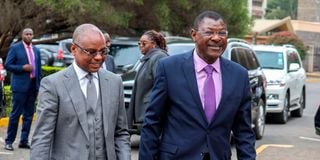Speakers must lead in defence of Parliament’s independence

Speakers Amason Kingi (Senate) and Moses Wetang'ula (National Assembly) at the Parliament Buildings on August 3, 2023.
Last week, some senators affiliated to the Minority Azimio coalition staged a walk out from a Senate retreat that was organised to take stock and plan for upcoming work. The subject of their concern was the Speaker of the Senate, Amason Kingi, whom they accused of partisanship in steering the affairs of the House.
According to the Senators, the Speaker has availed himself to the Executive’s convenience, literally circumventing House rules to secure the latter’s wishes and interests. They listed a number of tactics used by the Speaker to frustrate fair play, particularly targeting the Minority side’s work.
They include limiting debates on the floor of the House; deliberately frustrating bills sponsored by the Minority side through unnecessary delays; refusal to approve majority of the motions and statements sponsored by the Minority side; and hijacking of legislative ideas from the Minority side. Ideas from bills privately sponsored by the Minority, they noted, end up under government sponsored bills.
Last week’s protest is not isolated. A couple of times last year, the Minority side directed its wrath to the Speaker of the National Assembly, Moses Wetang’ula. In September, the Orange Democratic Movement (ODM) did not take kindly the comments by Mr Wetang’ula that appeared to criticise the decision by the party to expel a section of its MPs for what it considered gross misconduct. Those expelled included Felix Odiwuor (Langata), Tom Ojienda (Senator Kisumu), Elisha Odhiambo (Gem), Caroli Omondi (Suba South), and Gideon Ochanda (Bondo). The party accused the Speaker of openly taking sides in partisan positions despite holding an office requiring him to be a neutral arbiter. A similar charge would be levelled by the Azimio leader, Raila Odinga, in December. He demanded that Wetang’ula resigns as the leader of the Ford-Kenya party, arguing that his continued holding of the position compromises his neutrality and impartiality.
Speakers of Parliament hold a hallowed position in the country’s democratic edifice. They are in charge of one of the three arms of government, bestowing on them a critical role in safeguarding the country’s democratic system. Specifically, they are charged with steering the law-making, oversight; and representation role of Parliament. Their effectiveness dictates the fairness of the laws guiding the country; as well as the effectiveness of the implementation of the laws.
Both Speakers must be constantly reminded of Kenya’s agonising democratic journey, especially for Parliament and Judiciary. Historically, the two branches have been victims of the Executive’s disproportionate exercise of power. In fact, the atrocious historical experience in the hands of the Executive informed some of the codified guarantees in the current Constitution.
The ask to the Speakers is not an impossible one. Kenyans hold fond memories of Kenneth Marende’s Tenth Parliament. The current Speakers must make a deliberate choice to be fair arbiters. Though elected by ODM, Marende sought to rise above partisanship to faithfully and fairly apply the rules of the game.
- Mr Ogutu is a PhD student at the University of Nairobi. [email protected].




